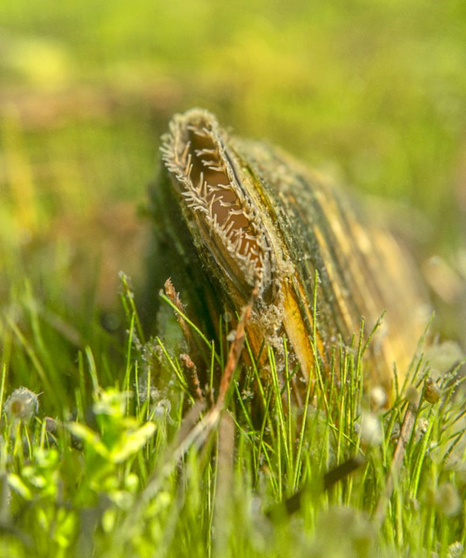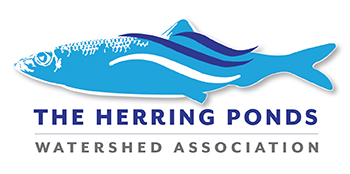Freshwater Mussels

Photo of fresh water mussel in Great Herring Pond by Ivan Mikolji
By Ramona Krogman
Freshwater mussels are neighbors worth protecting. These small pond dwellers may not be easy to see but they play an important role in maintaining a healthy pond. You may step over them while wading in the pond without noticing or realizing their contribution to water quality.
Mussels are bivalves. They have a two-part shell which protects their soft body parts. A ‘foot’ appendage is used to burrow into the mud or sand. They are equipped with gills to filter oxygen and nutrients from the water. You may only see a shell which can be easily mistaken for a stone.
There are more than 900 species of freshwater mussels, 270 species in North America. They colonize river and pond bottoms, burrowing into the sediment. Mussels can live as long as 100 years in under the proper conditions. There are 12 species of freshwater mussels in Massachusetts. Six are protected under the Massachusetts Endangered Species Act. They are an important part of the food chain as prey for otters, birds, and racoons.
Besides providing a food source, freshwater mussels aid in improving water quality. Freshwater mussels feed on plankton and small items by filtering the water flowing past their gills. They filter bacteria, algae, and other pollutants out of the water as they feed. Mussels are capable of sequestering impurities such as heavy metals and removing bacteria like E. coli. These contaminants accumulate inside the mussel. A mussel can filter up to 15 gallons of water per day providing a natural way of cleaning the environment.
Freshwater mussels have a complex reproductive process. Males release sperm into the water. Females take in the sperm, fertilize their eggs, and protect their larval offspring (glochidia) in an internal pouch. Once the larva is ready to leave the pouch, the female mussels deploy a special appendage which looks like prey to fish nearby. The fish move in to examine the possible prey. Once they are close, the female mussel sprays out glochidia into the gills of the fish. The glochidia burrow into the gills forming a cyst where they remain for approximately 3 weeks. They take nutrients from their host fish and take advantage of a free ride to new areas of the pond or river. After 3 weeks, the glochidia fall off the gills to burrow into the sediment to begin their lives. Species of freshwater mussels have certain fish species they prefer as hosts. Several species, such as the Eastern Pondmussel, choose alewife and blueback river herring as their hosts.
The freshwater mussel is tied to our stewardship of the pond in many ways. They play a vital role in the health and stability of the pond, but they depend on us to protect them. Since mussels collect impurities from the water, they are highly susceptible to chemicals from yard treatments and runoff. Limiting these contaminants protect the mussels, allowing them to contribute to advancing water quality. The mussels depend on a healthy, abundant population of fish to support their reproductive cycle. Protecting our river herring migration, and fish populations in general, supports the health of the freshwater mussel beds.
For more information on the current status of freshwater mussels in Massachusetts you can go to www.mass.gov/nhesp (Natural Heritage & Endangered Species program) or www.mass.gov/orgs/division-of-fisheries-and-wildlife.

Comments
Freshwater Mussels — No Comments
HTML tags allowed in your comment: <a href="" title=""> <abbr title=""> <acronym title=""> <b> <blockquote cite=""> <cite> <code> <del datetime=""> <em> <i> <q cite=""> <s> <strike> <strong>